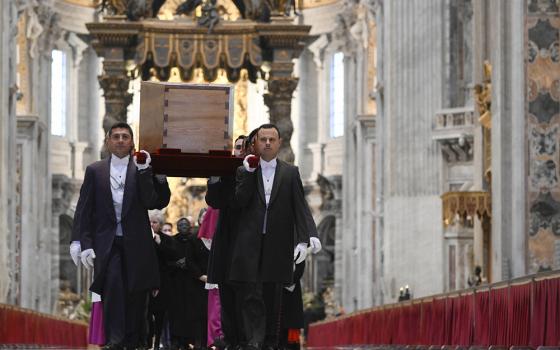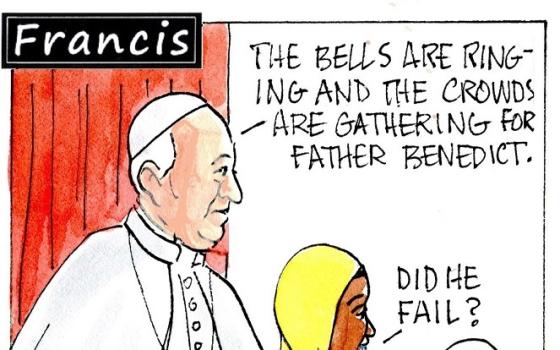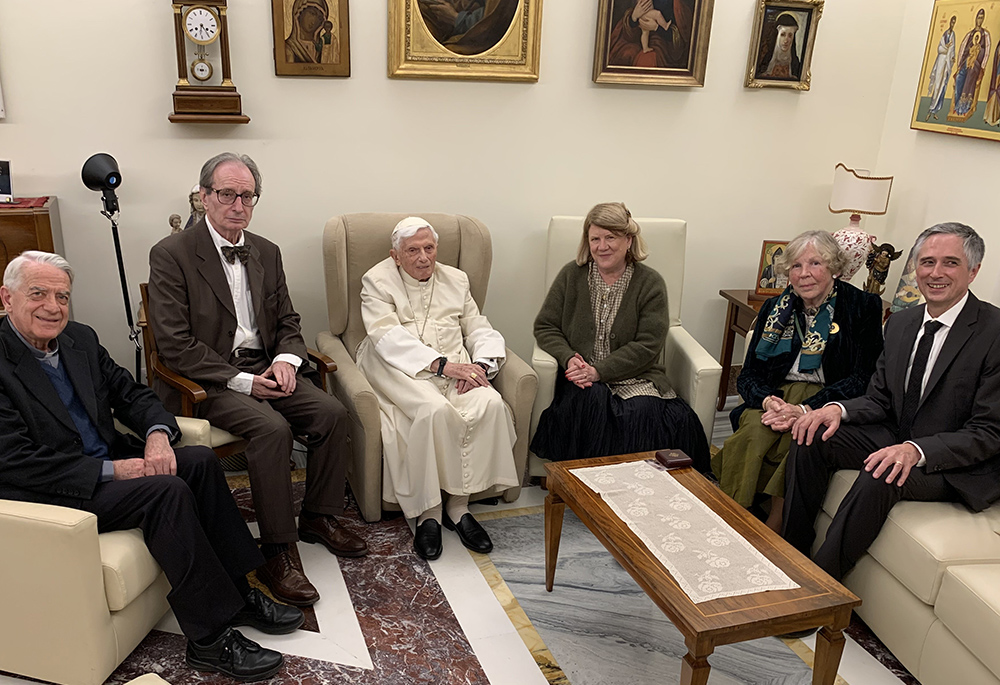
Ratzinger Prize recipients are pictured with retired Pope Benedict XVI Nov. 13, 2021, after a ceremony for the conferral of the prize by Pope Francis at the Vatican. From left Jesuit Fr. Federico Lombardi, president of the Joseph Ratzinger-Benedict XVI Foundation; French professor Jean-Luc Marion; Pope Benedict; Australian theologian Tracey Rowland; and German professors Hanna-Barbara Gerl-Falkovitz and Ludger Schwienhorst-Schönberger. The award honors theological research and is named after Benedict, the former Joseph Ratzinger. (CNS/Courtesy of Joseph Ratzinger-Benedict XVI Foundation)
Long before German Cardinal Joseph Ratzinger was elected Pope Benedict XVI in 2005, theologian Tracey Rowland was engaged in studying his scholarship — a bevy of academic work that she believes should one day lead to the late pope being named a doctor of the church.
She would go on to write two books and scores of articles exploring Ratzinger's theological contributions, and in 2020, Rowland, the St. John Paul II Chair of Theology at the University of Notre Dame Australia, was awarded the prestigious Ratzinger Prize for Theology.
Rowland, who was appointed by Pope Francis to the Vatican's International Theological Commission and served there from 2014-2019, was the first Australian and only third woman to win the award.
In an email interview with NCR, en route from Australia to Rome to attend Benedict's funeral on Jan. 5, Rowland spoke of the late pope's influence on the Second Vatican Council, his personal style of engaging fellow academics, her thoughts on his legacy, and much more.
Following is the interview, lightly edited for length and context.
NCR: During his time as a theological adviser at the 1962-65 Second Vatican Council, then-Fr. Joseph Ratzinger was known as something of a church reformer. People talk about the student uprisings of 1968 as a key moment of change in Ratzinger's psyche, and how he approached the work of theology. Does that idea of this great change in his thinking strike you as true?
Rowland: I am one of those who argue that there was no change in Ratzinger's general theological vision pre- and post- '68. During the council, he was on the reform team because he was not supportive of neo-scholasticism. He preferred St. Augustine and St. Bonaventure to the 16th century Jesuit Fr. Francisco Suárez and others of the Baroque era. When he was a seminarian, his prefect of studies said of him that "scholasticism wasn't his beer." Not being into scholasticism made him look like a rebel in 1961, but by 1968 being into Augustine and Bonaventure rather than Marx or Marcuse made him look conservative.
He once said that he didn't change but others around him did and the culture of the Western world certainly changed. Therefore, I agree with those, including a number of his former students, who say that he never changed his theological spots. His livery, so to speak, remained very Augustinian throughout his life.
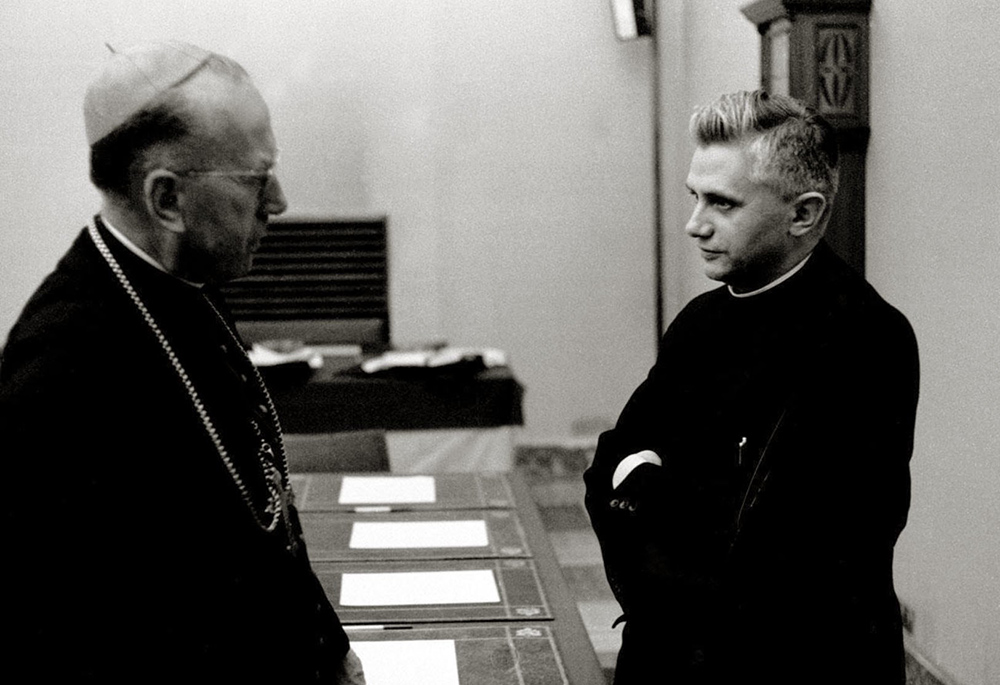
Fr. Joseph Ratzinger, the future Pope Benedict XVI, talks with Cardinal Franz Konig of Vienna during the Second Vatican Council at the Vatican in 1962. Pope Benedict died Dec. 31, 2022, at the age of 95 in his residence at the Vatican. (CNS/Courtesy of Diocese of Mainz archives, KNA)
What did change was the culture of the West and I think that changed his research and pastoral priorities. He ended up having to spend several decades simply defending concepts like truth, reason and rationality, which is quite ironic, given that Germany is so strongly associated with the so-called Age of Enlightenment. By the end of the 20th century, it is a cardinal who is Germany's most passionate advocate for rationality, albeit a rationality intrinsically linked to faith, an Augustinian rationality, not a Kantian rationality.
In short, his basic theological framework, his fundamental theology, did not change, but his ideas about what needed to be done, his pastoral priorities, began to be focused on defending the faith against the social theories of the New Left. He did not read the cultural revolution of the late 1960s as something positive and he never tried to market Christianity with reference to the buzzwords of that revolution.
What was it like on a personal level to engage with him on ideas?
I was only awarded my doctorate in 2000 and thus I was far too junior a scholar to have personal meetings with the prefect of the Congregation for the Doctrine of the Faith. I did attend conferences in Rome between 2000-05 where he was a speaker and what I most remember about those lectures was that he spoke so clearly I could follow most of the Italian. Many Italian academics speak in a way I describe as "floral." Concepts are so poetically embellished it is hard to get a gist of the central argument. I can remember one of my friends joking about a line from a young professor Angelo Scola (later the cardinal archbishop of Milan) — "Christianity is the moment when the now meets the forever."
To Anglo ears that is very poetic but not very concrete. However, when Ratzinger spoke, he was always easy to follow and one knew exactly the point he was arguing.
On a few occasions when he was the reigning pontiff, I was introduced to him in the kind of lineups that happen at the Vatican. Each time when an aide said I had written books about his theology he just looked embarrassed. On one occasion when he was still a cardinal, I was introduced to him as an academic from Australia and he looked surprised and said, "You have come all the way from Australia for this conference?" I could see him thinking, "I wouldn't sit on a plane for 29 hours to attend this meeting."
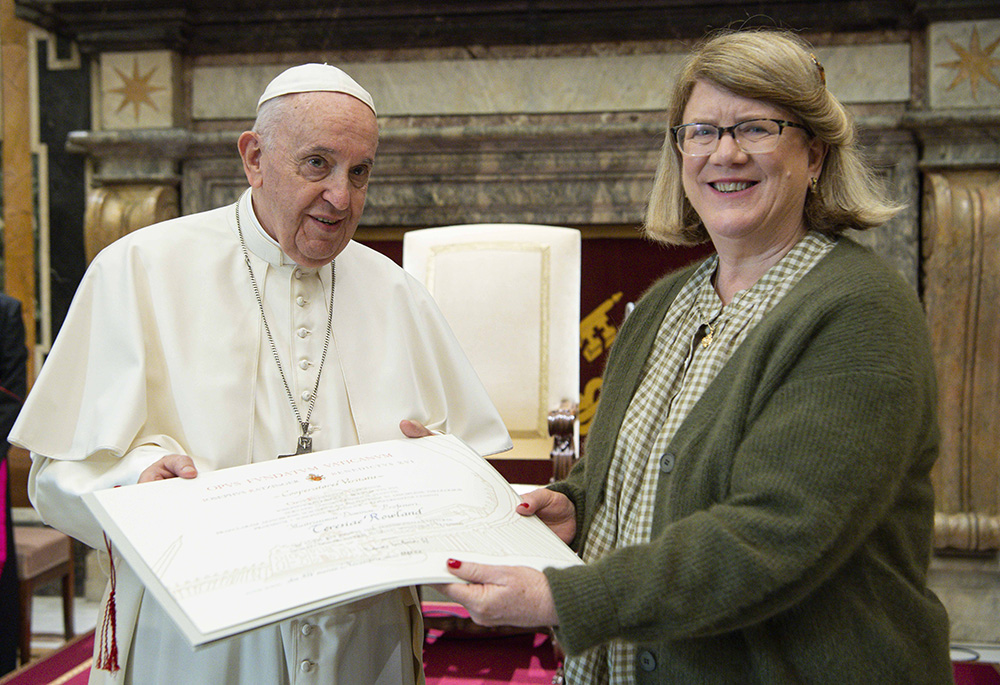
Pope Francis presents the Ratzinger Prize to Australian professor Tracey Rowland during a ceremony Nov. 13, 2021, at the Vatican. The prize was also given to German professors Hanna-Barbara Gerl-Falkovitz and Ludger Schwienhorst-Schönberger; and French professor Jean-Luc Marion. (CNS/Vatican Media)
On the day of the conferral of the Ratzinger Prize in 2021, the four prize winners were taken to his monastery for a one-hour meeting with him. In addition to the prize winners, Jesuit Fr. Federico Lombardi and Archbishop Georg Gänswein were also present. Thus, it was an intimate gathering of only six people. We were each invited to tell him about our research.
The subject about which he became most animated was Old Testament biblical scholarship. This was the field of one of the prize winners and he asked a number of questions about the research projects of leading Old Testament scholars. I also shared with him the story of the work I was doing on a Lexicon of his thought, with contributions from theologians across the world.
He knew about the Lexicon and had written a foreword to it. In the foreword, he made quite a lot of the fact that 72 scholars had contributed to the Lexicon, and of course, for him the number 72 immediately shouted "Septuagint." However, for the members of the editorial committee the fact that we had 72 contributors initially meant nothing of theological relevance to us. Not one of us thought, "Isn't this interesting, we have the same number of contributors as the Septuagint."
It only became important when we received a beautiful foreword from him where he talked about the theological relevance of the number 72. Our general editor then did a recount and discovered to his horror that we had only 71 contributors. The first count of 72 was wrong. We dealt with this crisis by roping in Hanna-Barbara Gerl-Falkovitz, one of the prize winners, as our No. 72. I told him the whole story and he was really amused. He could well understand that four academics, some with double doctorates, could find it difficult to count to some number less than 100.
Advertisement
What was his impact on understanding/interpretation of Vatican II?
He was one of those who argued that the documents of the council should be read with a Christocentric accent within a hermeneutic of reform, not revolution or rupture. It was in part the mission of the Communio journal he founded with the French Jesuit Fr. Henri de Lubac and the Swiss Fr. Hans Urs von Balthasar to promote that approach to the council.
Is there anything about him or his work that you think is underappreciated/unknown by the general Catholic public?
I know many people who were brought back to the faith by reading his Jesus of Nazareth trilogy. I think this trilogy is under-utilized in catechetical programs.
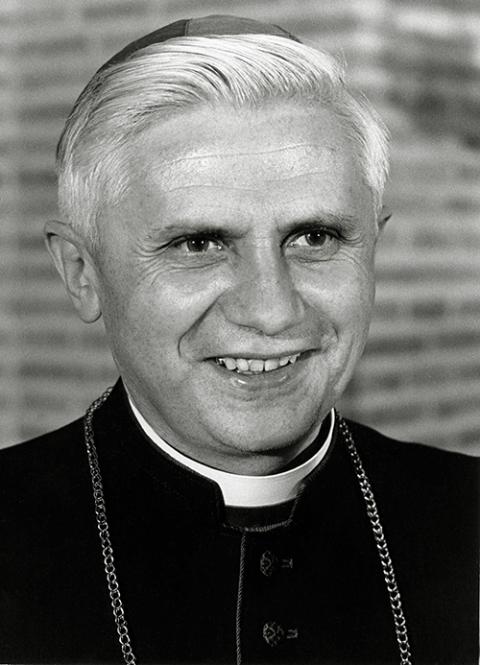
Archbishop Joseph Ratzinger of Munich and Freising, the future Pope Benedict XVI, is pictured Nov. 15, 1977. (CNS/KNA)
How do you see criticism of Ratzinger's impact on theology during his time as the prefect of the Congregation for the Doctrine of the Faith? Did he crack down on theologians too hard at times?
The more I read about the divisions in postconciliar theology the more I come to the conclusion that the baseline cleavage is between those who think that contemporary social theory should become a partner for theology and those who think that contemporary social theory is not theologically neutral, and therefore before one goes about making it into an academic partner, one needs to first make a study of its theological presuppositions.
There were many Catholic scholars in Europe in the '60s and '70s who thought that Marxism got God wrong, but everything else about it was OK. Indeed, one scholar remarked that the liberation theology of Latin America bears the stamp "made in Germany" — that is to say that it was the creation of Latin American clerics who wrote their doctoral dissertations under Marxist enthusiastic professors in Germany. I would say: "made in Germany and Belgium."
In any event, the point is, Ratzinger came across the territory of contemporary social theory precisely because so much of it comes out of Germany, especially out of the Frankfurt School, and he found it highly problematic. Others disagreed. So, I would say that how one answers this question really depends on what one makes of contemporary social theory, especially social theory with a Frankfurt School pedigree. I am not a fan of the Frankfurt School, though, like Ratzinger himself, I acknowledge that they got some things right.
What do you think is his most significant contribution to the magisterial teaching of the church?
The work he did at the Second Vatican Council on the document Dei Verbum, the Dogmatic Constitution on Divine Revelation.
Do you anticipate him one day being named a doctor of the church?
Yes, I think some future pontiff should name both Ratzinger and Cardinal John Henry Newman as church doctors on the same day. There is such a strong affinity between them. Church doctors also acquire titles like "the Seraphic doctor" (Bonaventure) or "the Angelic Doctor" (Aquinas). I have suggested "Doctor of Incarnate Beauty" for Ratzinger. He loved art and music and cats and within his many publications there is a very strong attention to beauty (along with truth and goodness).
I think his spirituality was deeply Benedictine and the Benedictines tend to hold the flag, so to speak, for beautiful liturgy and tranquil abbeys and stewardship of rural pastures and villages. It's easy to feel close to God in these places. The beauty of Benedictine spirituality resonated with his Bavarian heart.





